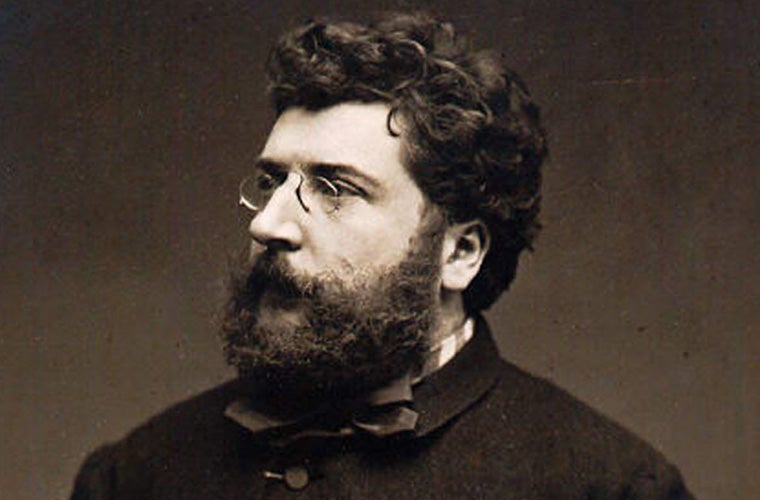
Georges Bizet
1838 - 1875
Biography
Georges Alexandre César Léopold Bizet was born on October 25, 1838 in Paris. His mother was a pianist and his father taught voice and composed. It seems likely that Bizet was probably as musically precocious as Mendelssohn or Mozart. It is said that he could read and write music by the age of four, and with a very encouraging family (his parents actually hid books from him to suppress his literary bent and encourage more diligent applications to music), Bizet's future in music was pre-ordained.
Bizet entered the Paris Conservatory de Musique in 1848 at the age of nine, and studied under Zimmerman, Halévy and Gounod until the age of twenty. His years there were punctuated by a series of prizes for theory, piano, organ and composition. In 1855, at the age of seventeen, he composed his lovely Symphony in C. This piece was not performed until 1935 because Bizet was afraid that he would be charged with imitation, it was that strongly influenced by his teacher Gounod. In fact, on careful listening, this piece recalls Beethoven, Haydn, Mendelssohn, Schumann, Schubert and Mozart as well as Gounod's Symphony in D. Although Bizet chose not to have this symphony performed, he did later quote it in Les Pêcheurs de Perles and La Jolie Fille de Perth.
Bizet was a Parisian at a time when Paris was a world center of opera, boasting some of the best-equipped opera houses and theatres, including the Paris Opéra. Nearly every 19th century composer of opera, from Wagner to Verdi, wanted to have his works staged there. For French composers, writing opera was the one sure way to musical fame and fortune. Like all French composers of his time, Bizet desperately wanted to write successful operas. Bizet did win the coveted Prix de Rome for composition in 1857 with the premiere of his sparkling operetta Le Docteur Miracle, and the 1867 premiere of his opera La Jolie Fille de Perth, was also favorably received by the press. But from then on, his career was followed by bad luck which pursued him to the grave.
After a succession of failures, Bizet pinned all his hopes of Carmen, which was to be his last opera. At its premiere in Paris on March 3, 1875, many in the audience were shocked by its stark realism: Carmen and her co-workers from a cigarette factory smoking on stage and the sordid stabbing at the end. The sheer dramatic power of the music also proved a little too much for those who had come to the theatre simply to be entertained. Today, Carmen is regarded as among the finest examples of 19th century Romantic music written for the theatre, but Bizet never knew of its great success. His health and spirit shattered by the critical reception of his Carmen, Bizet retreated to the family home at Bougival.
Bizet died on June 3, 1875, at the age of 37. On his death, Carmen became a huge success, and Bizet was hailed as a master. Although chiefly known for his Carmen, he was also as inspired a melodist as Schubert and knew exactly how to spice a tune with pungent harmonies, catchy rhythms and instrumental colors.